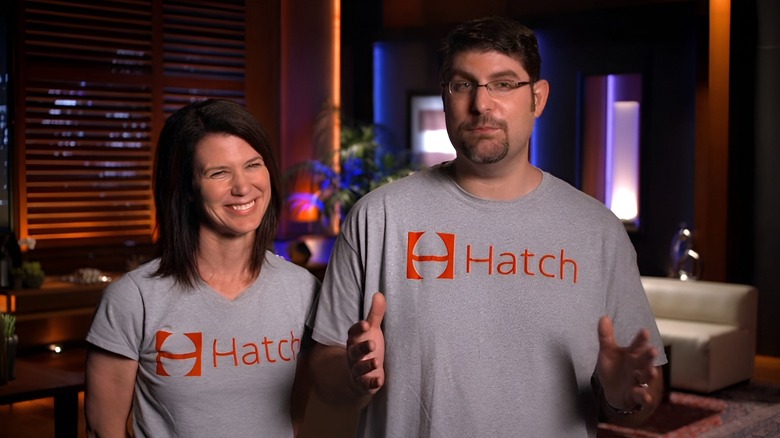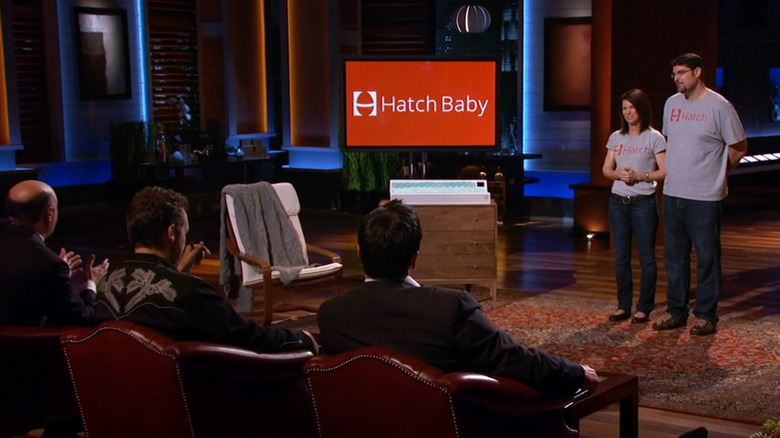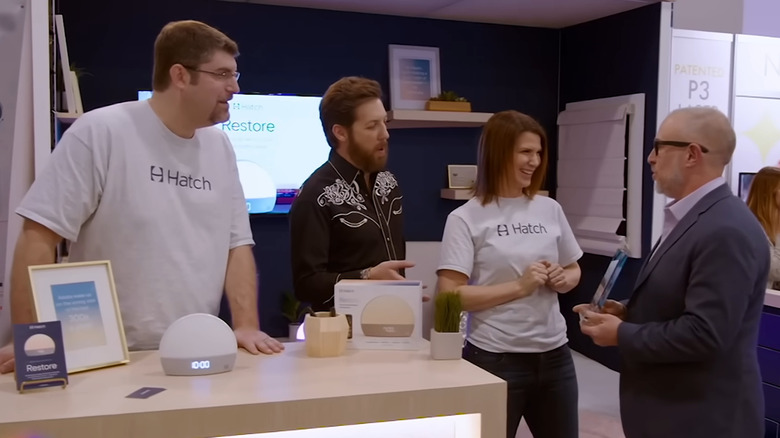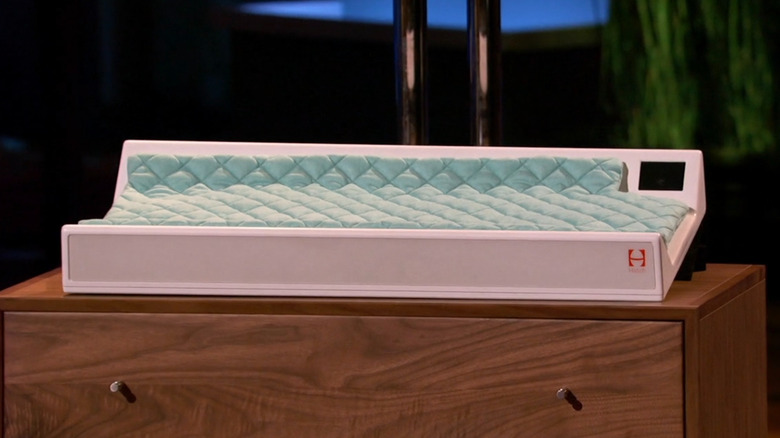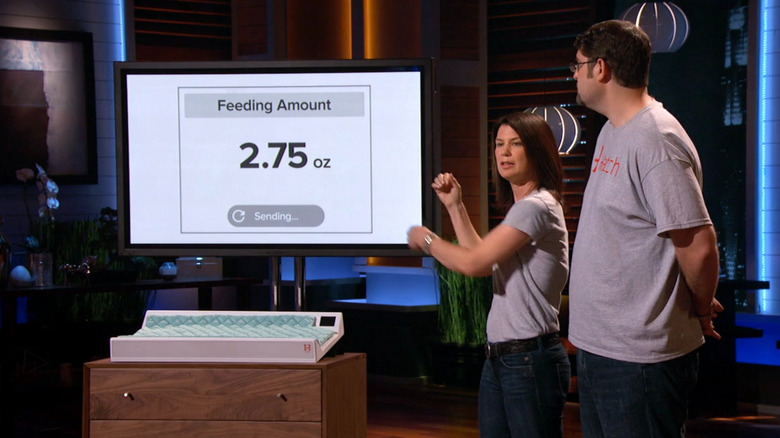Whatever Happened To Hatch Baby After Shark Tank?
We may receive a commission on purchases made from links.
Keeping an eye on your baby's development is crucial to ensuring their well-being. Thankfully, a solution is at hand with the one and only Hatch Baby. Created by California-based couple Ann Crady and Dave Weiss, Hatch Baby replaces traditional baby changing pads by incorporating smart technology that monitors your infant's weight, feeding habits, and more. The information is then sent to your smartphone through an accompanying app, allowing parents to have these details at hand when visiting their pediatrician.
The company's founders are no strangers to aiding parents. The duo met while working for the leading digital parenting resource BabyCenter, a division of Johnson & Johnson, where Ann worked in consumer experience, and Dave was a product manager. Ann went on to develop her own social network for parents called Maya's Mom, which would later be acquired by Johnson & Johnson. After becoming parents themselves, Ann grew anxious about whether her baby was receiving enough breast milk and developing properly. This prompted her and her husband to create Hatch Baby to provide a solution for parents everywhere. But will it be able to detect the possibility of an investment on "Shark Tank"?
What happened to Hatch Baby on Shark Tank?
Season 7 of "Shark Tank" sees Ann Crady Weiss and her husband Dave shoot their shot with the celebrity investors, seeking a $250,000 investment for 2.5% of Hatch Baby. However, whereas many entrepreneurs would stand strong on the $10 million valuation, the Hatch Baby team has another trick up their sleeves.
The investors grow weary upon learning the company is still in the pre-revenue stage, but Ann assures them that their vast experience in the space adds to their value. They reached the valuation after raising $1.7 million from prior investors as a convertible note, meaning the money was given as a loan but can be converted into an equity stake. A single unit costs $89 to produce and is planned to be priced at $299, which worries the sharks. Ann reminds them that items such as baby strollers go for $500 on average and that parents are more than willing to drop such an amount for their babies. They project sales of $6 million once they officially launch, which the sharks find wildly optimistic.
At first, all the investors go out, believing there is too much competition and the price will drive parents away. While this would normally indicate the end of a "Shark Tank" deal, Ann has another proposition. They still have $250,000 left on their convertible note and offer to bring a shark on that note under the same terms as those who invested during its development phase. Chris Sacca likes the new structure and takes the deal, which equates to $250,000 for 25% equity.
Hatch Baby after Shark Tank
Thankfully, Ann Crady and Dave Weiss' creative deal with Chris Sacca paid off in the episode's aftermath. After airing on January 15, 2016, the "Shark Tank" effect came upon Hatch Baby, with an onslaught of new inquiries, online traffic, and discussions with other business owners, which kept the team hopeful for future partnerships.
In Hatch Baby's first update segment from Season 9, the team share how Sacca further aided them by trying the product out on his newborn and giving feedback. They changed the design to be more compact and affordable, lowering the price to $99. One year since its initial "Shark Tank" appearance, Hatch Baby had sold $1 million.
Season 11 revisits Hatch Baby. Despite their success with the changing pad, the team realized there wasn't a vast market for the product. They then targeted sleep-related issues and created the nightlight sound machine, Rest. The switch was lucrative, bringing in $40 million in sales since "Shark Tank." They also unveiled the Hatch Restore, which offers the same sleep solution for adults. While presenting at the Consumer Electronics Show, they are bestowed the CES Editor's Choice Award. "The future for Hatch is limitless, and I have no doubt that this will be one of the biggest companies in the history of 'Shark Tank,'" Sacca states. In 2019, Amazon announced that it would be investing an undisclosed amount to Hatch Baby as part of its Baby Skill Activity API program, adding to the $18.7 million raised in other funding efforts by the "Shark Tank" company.
Is Hatch Baby still in business?
Since shifting the company's focus, Hatch Baby has gone through a transformation. The brand is now simply called Hatch and no longer prioritizes the changing pad presented on "Shark Tank." However, a quick search finds they are still available through retailers, including Amazon, Target, and Best Buy. Hatch's main website presents an array of sleep-related products for children, such as the Rest and Rest Go, as well as adults with the Restore. There are several accessories available, such as the Cloud Pillow, coverlets for the Rest, travel cases, and power cords. Hatch also offers Hatch+, a subscription service bursting with light and audio experiences that work with Hatch devices and promise excellent sleep for users of all ages.
Its products are also highly rated by users. On Amazon, its best seller is the Hatch Rest. Outside of some minor complaints regarding the range of noises and strength of the light, many found the item extremely useful and enjoyed the ease of connecting it to their phones. But that's not to discredit Hatch's other offerings. The Restore has received similar praise from some notable names, being deemed one of the best inventions of 2020 by Time and even getting the approval of "Lizzie McGuire" star Hilary Duff. By 2022, Hatch was estimated to have a net worth of $36 million.
What's next for Hatch Baby?
Hatch may no longer purely serve the baby industry, but that hasn't seemed to hamper its success. The company's clever pivot to creating sleep-specific technology and expanding to adult consumers has allowed the operation to grow far beyond what was thought possible. But like all innovative businesses, Hatch is not satisfied with staying where they are.
In an interview with Medium, co-founder Ann Crady Weiss gave a secretive but nevertheless exciting glimpse into what's next for the "Shark Tank" company. "While I can't give specifics, just know that we're always researching, building, and testing products for both children and adults that will uplevel your rest game," she said. Investor Chris Sacca has stated in previous "Shark Tank" update segments that he envisions Hatch becoming a billion-dollar business. Coming from a key investor of such massive brands as Uber, Twitter, and Instagram, that's no small compliment, and there doesn't seem to be any stopping Hatch from pursuing the ambitious milestone.
